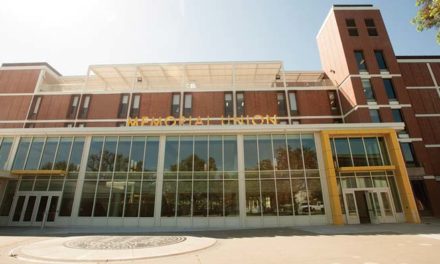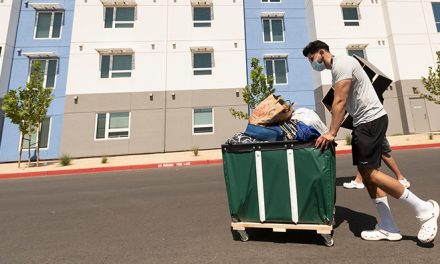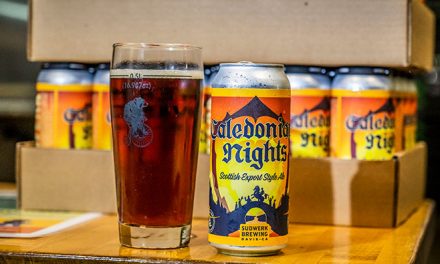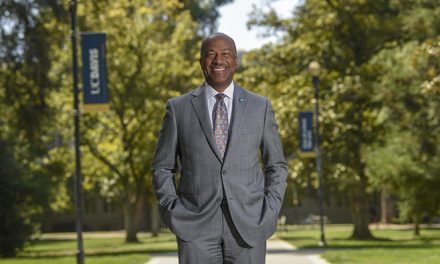Capital Ideas

UC Davis alumni are leading Sacramento’s comeback from recession, helping give the city a new vibrance.
They may have started out in Davis, but some successful alumni have gone across the Causeway to make their mark in Sacramento. As the region continues to stage its remarkable comeback from recession, a few UC Davis grads are helping propel the capital city forward. One of them won the mayorship last year. Another spearheads community impact for the Kings Foundation, which now calls a new arena home, bringing with it the promise of a renewed vitality downtown. Still others are growing small businesses, helping nonprofits and contributing to developing the local economy. Meet a sampling of the noteworthy alumni making waves in their fields.
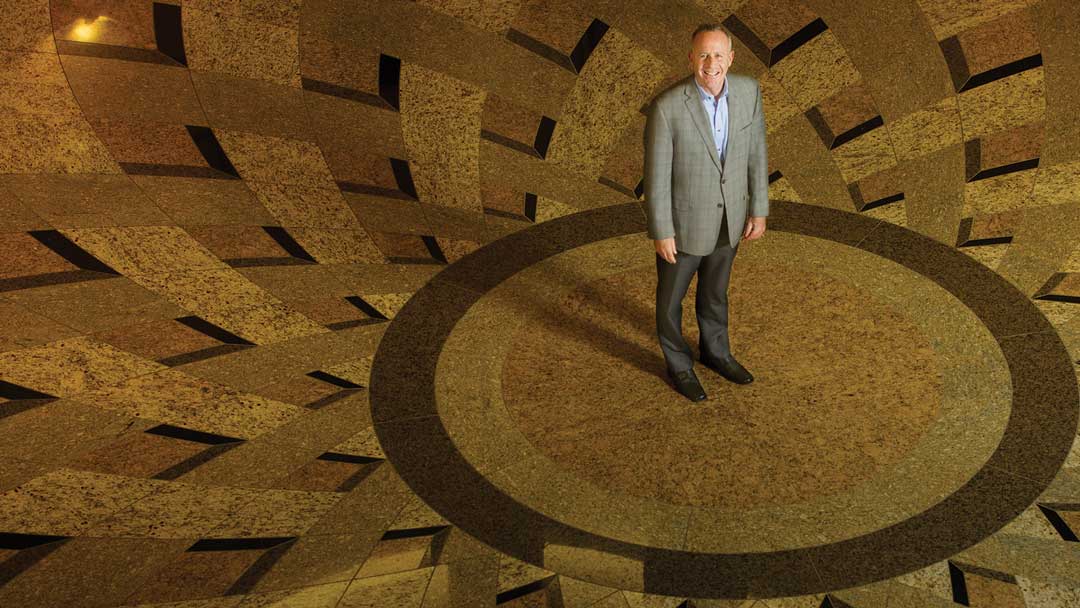
Photo by Karin Higgins/UC Davis
Darrell Steinberg
In his first 100 days as mayor of Sacramento, Darrell Steinberg, J.D. ’84, didn’t have much time to rest.
“We want to create a quality of life — a range of career and job choices, amenities, public safety and good schools — that allows that [UC Davis] graduate to say, ‘I want to move to Sacramento.’”
Since taking office in December, he promoted his initiatives, which include strengthening the economy, investing in youth and addressing homelessness. He revived the city’s package of ethics measures as part of an effort to increase transparency. He marched to the capitol alongside women and protested the travel ban at the airport in January. He traveled to Washington, D.C., twice to advocate for issues that are important to the community, including its status as a sanctuary city.
It’s all part of one overriding theme that Steinberg likes to pose in the form of a question: When students graduate from UC Davis, will they choose Sacramento as the place they want to live and start their careers?
“That really is the question because young people who graduate from top universities have a lot of choices,” said Steinberg. “We want to create a quality of life — a range of career and job choices, amenities, public safety and good schools — that allows that graduate to say, ‘I want to move to Sacramento.’”
The city is off to a good start, eyeing economic growth targets and a more cosmopolitan existence, he said in an interview just three months after taking over as mayor.
“Sacramento is a city that’s on the move and sort of changing some of its identity,” Steinberg said. “It has not disappointed me in the first 100 days.”
Background: Steinberg has more than 20 years of experience serving the Sacramento community. He was elected to the city council in 1992. He later won a state Assembly seat and then served on the state Senate through his term’s end in 2014. Last year, he ran for mayor, winning with 59 percent of the vote. “I decided I wasn’t done; I still had more to give. That was the bottom line, very simple.”
Vision for Sacramento: “We can no longer just be a government town. It’s not our future. We are proud to be a capital city, but we want to be so much more.” Steinberg pointed to opportunities in technology, innovation, arts, food and agriculture that could help shape Sacramento’s identity moving forward. “The modern economy is focused as much or more on private industry,” he said.
A partner in UC Davis: “We want to bring more of UC Davis across the Causeway. When you think about farm to fork — the growing restaurant industry here — we could be the center of everything food-related, and UC Davis could be the hub of our research arm and where we produce the talent.”
Focus on youth: Steinberg is working with local businesses to create 1,000 paid internships for incoming high school seniors this summer.
Fighting homelessness: “It’s a major quality of life issue. It’s an absolute shame on all of us that it has grown in the way that it has. And I think we can do better.” Steinberg’s approach involves outreach, case management, mental health and substance abuse services, and permanent housing. His goal is to get 2,000 people off the street in the next three years.
Coming up next: Steinberg is focused on the areas of Sacramento that are brimming with potential, namely the riverfront and the railyards just north of downtown. The Railyards Project, a development plan for 244 acres of mixed-used space including a new stadium for Major League Soccer, has already been approved by the city council. “We want to make sure that as it develops, we have some signature public amenities. I love the idea of a public market like what they have up in Seattle.”
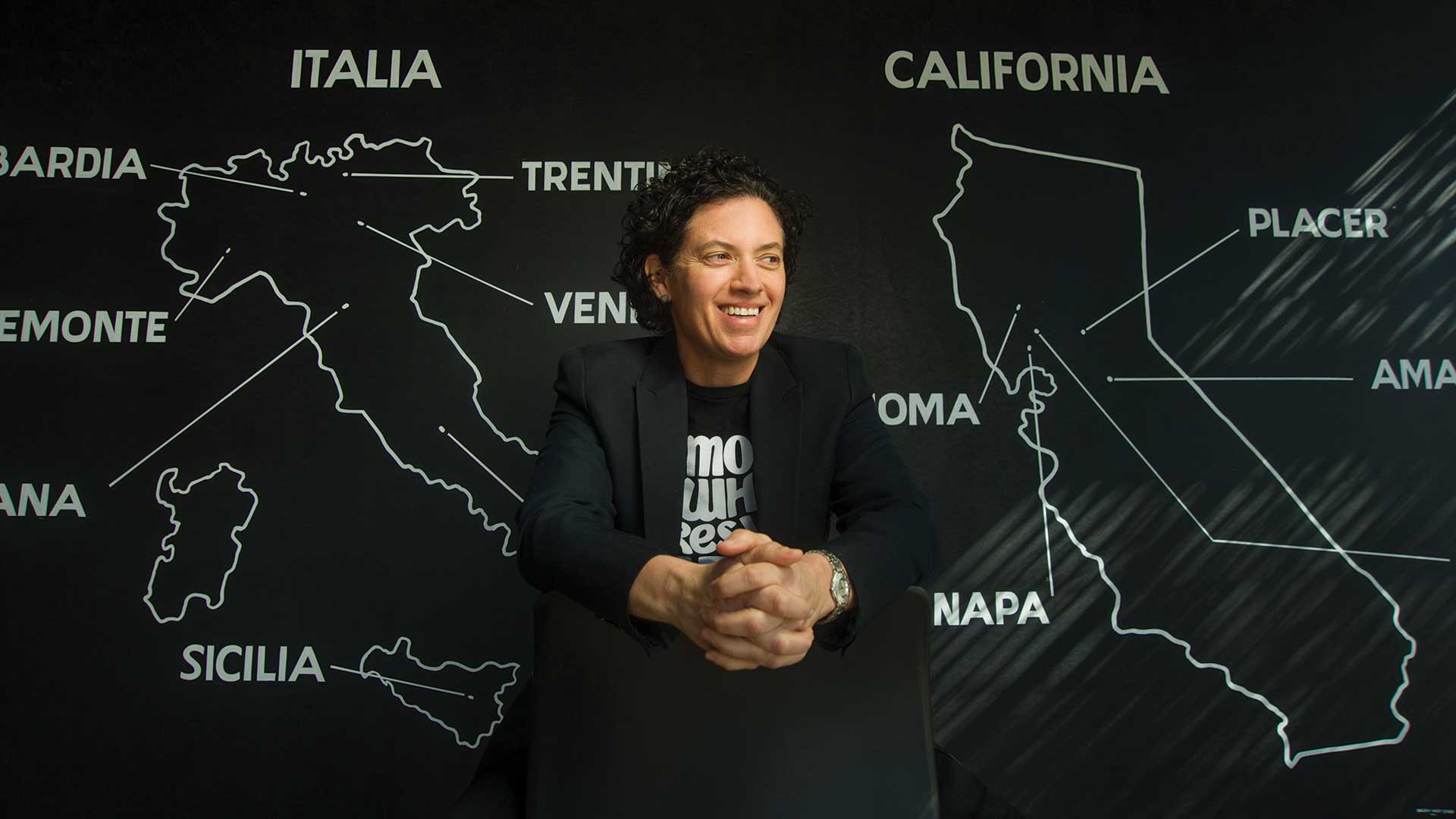
Photo by Karin Higgins/UC Davis
Andrea Lepore
When the pizzeria Hot Italian opened in 2009, co-founder Andrea Lepore ’92 knew she was taking a risk with her midtown location. Until then, midtown’s restaurant activity was centered farther north.
“When we opened at 16th and Q, we really were on the outskirts of midtown,” she said. “No one really wanted to claim us.”
The risk paid off, and now Hot Italian is positioned among more restaurants, new luxury apartment developments and a just-opened coffeehouse.
Background: Lepore turned a college internship with the Sacramento Kings into a successful career in media relations with the team. She briefly ran her own cause-related sports marketing agency before starting Lepore Development, a branding and development firm focused on urban revitalization projects.
On attracting people in the early days: Hot Italian hosted special events, including a music series and an Italian film festival. “We had to be creative to come up with ways to draw people in — because we were an island over there.”
Recent accomplishments: A Davis location opened in 2016. “UC Davis is the No. 1 ag school and we use all local ingredients, aside from some meats and cheeses from Italy, so it made sense to be in the heart of ag country.”
Sustainably focused: All three Hot Italians (another is in Emeryville) are green-certified. The 6,000-square-foot Sacramento location is LEED certified. (Lepore earned a master’s degree in sustainable design from Boston Architectural College in 2016.)
Coming up next: Lepore Development is working on opening Solomon’s Delicatessen on K Street, as well as The Food Factory, an incubator for small food producers in the Alkali Flats neighborhood.

Photo by Gregory Urquiaga/UC Davis
Urijah Faber
Urijah Faber’s interest in healthy living started well before his time as a professional athlete.
When he got sick as a child, the treatment involved raw foods like ginger and wheatgrass juice. He’s never had more than a taste of Coca-Cola. Sacramento, and its farm-to-fork culture, provides the perfect backdrop for Faber ’03 — who in December retired from a career in the Ultimate Fighting Championship — to juggle a plethora of health-oriented businesses including a mixed martial arts gym.
Background: Faber’s career as a professional fighter started with an event at Colusa Casino that earned him $400, and ended with a sold-out win at Golden 1 Center. In 2004, he formed Team Alpha Male, which has produced professional fighters like UFC bantamweight champion Cody Garbrandt. Faber has been featured prominently on “The Ultimate Fighter,” a reality show on Fox Sports 1, and he and Garbrandt are coaches for the show’s 25th season, which will culminate in a July fight. Also in July, Faber will be inducted into the UFC Hall of Fame.
Fitness in a fit town: Health and fitness are always on Faber’s mind. He’s co-owner of a café that serves acai bowls and smoothies, partners with a kombucha company (he has a tap in his kitchen) and hopes to inspire people — not just aspiring fighters — to get fit at his newly expanded gym, Urijah Faber’s Ultimate Fitness, near California State University, Sacramento. “It all rolls into one arena, which is my lifestyle.”
Building business sense: Faber’s father called his construction company Faber and Sons even when the two Faber boys were just kids, priming them for an entrepreneurial future. Faber continues to partner with his father and brother on construction projects like his gym renovation and home remodels. “I’m kinda wired like this,” he said. “The more I accomplish, the more I want to accomplish.”
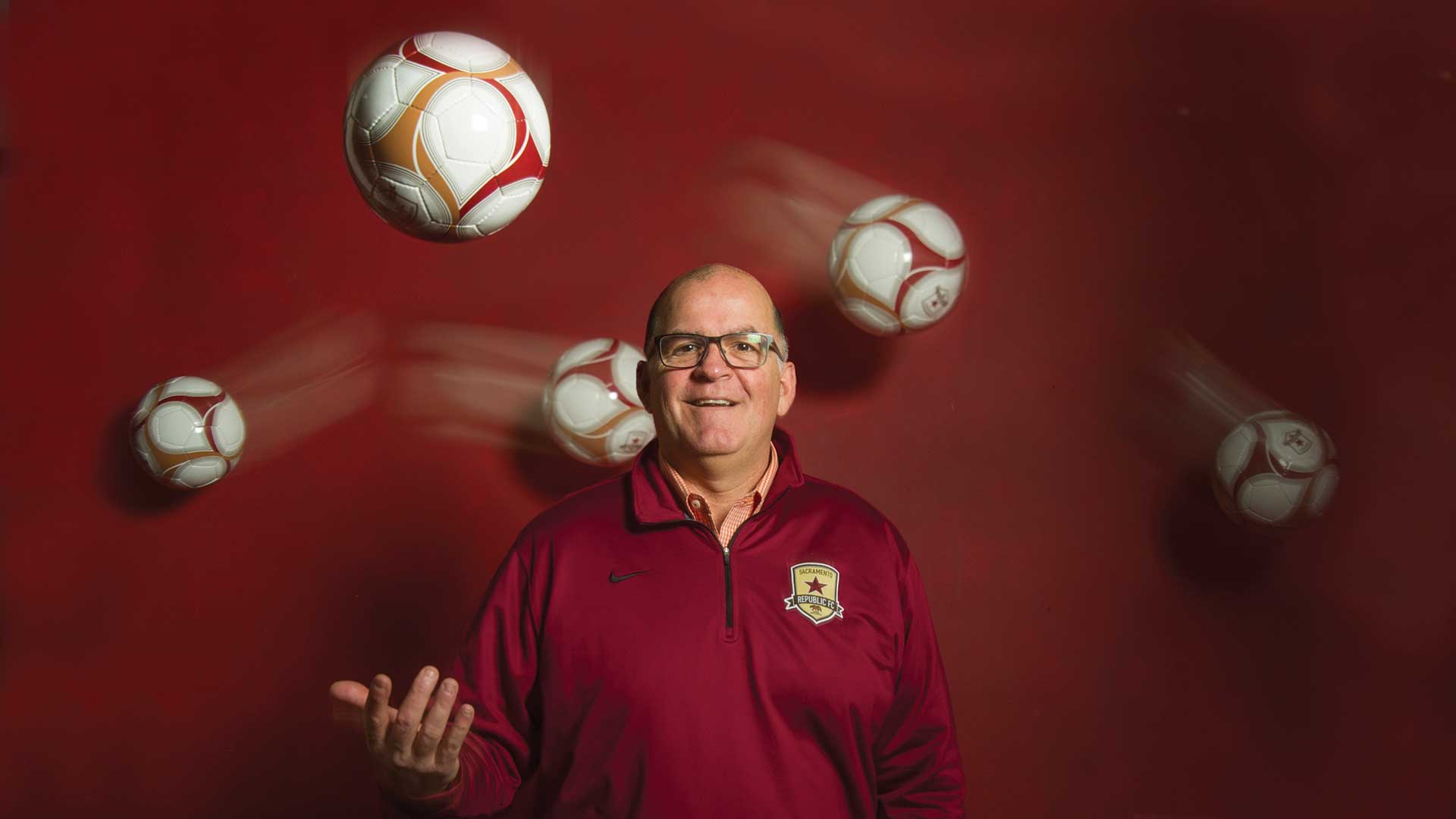
Photo by Karin Higgins/UC Davis
Warren Smith
With the approval of a soccer stadium at the Sacramento Railyards and a Major League Soccer bid for Sacramento Republic FC currently under consideration, this “indomitable city” is cementing its identity as a soccer town.
That suits Warren Smith, president and co-founder of Sacramento Republic FC, just fine. With 130,000 registered soccer players in the city — more than baseball, basketball and football combined — Smith saw an enormous opportunity five years ago for “the beautiful game” to play a lead role in Sacramento’s evolution.
He said giving Republic FC fans a sense of ownership — they chose the brand, crest and motto — allowed the team, currently in its third season, to develop strong relationships and community quickly. “Our fans have an unbelievable passion for the sport and the brand,” said Smith.
On knowing people: Smith said the skills he learned in his psychology classes at Davis have helped him in his career, which includes serving as CEO of renewable energy business CleanWorld and co-founding the Sacramento River Cats. “Understanding human behavior is very much at the foundation of everything I do,” said Smith.
A role model: Smith is a mentor for young fans interested in sports careers. He’s employed Aggie student-athletes on street teams, and to assist with sponsorships and game days. He speaks with kids on and off the field. “I try to impress on them that it’s a great first job opportunity, but we work long, hard hours,” said Smith. “It’s not a place to build wealth.”
Diverse yet united: Players hail from all over the world, including Africa, Ireland, England and Mexico. The diversity of the team is mirrored in the region. “Our fans come to the field and share a common bond, a love of our team and for Sacramento,” said Smith. “That’s pretty exciting.”
Do what you love: In considering his approach to life, Smith recalled the words of friend and fellow Aggie Ted Prenovost ’90, who passed away Feb. 10. “He would ask, ‘How do you spell love?’” said Smith. “And the answer was t-i-m-e. Spend time with the people you love, doing what you love. I thought that was perfect.”
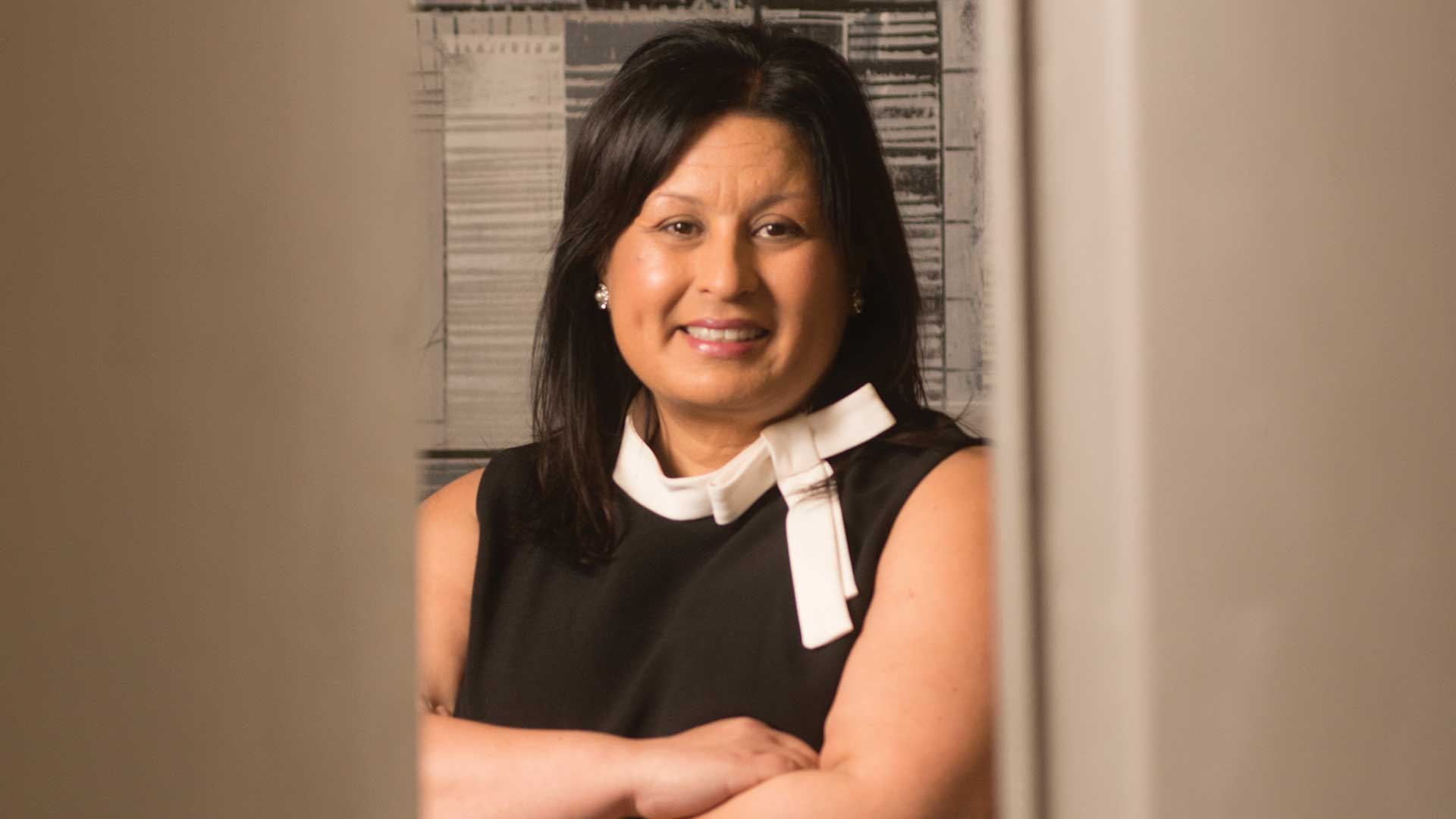
Photo by Gregory Urquiaga/UC Davis
Cathy Rodriguez
Cathy Rodriguez ’99 shaped her career by building relationships and helping others. Now president and CEO of the Sacramento Hispanic Chamber of Commerce, Rodriguez recalled her first boss after college, who gave her the confidence to grow professionally.
He encouraged her to apply for a new position, and her colleagues even reviewed her resume, conducted mock interviews and wrote reference letters. “Only later I learned that wasn’t the norm,” Rodriguez said. “I’ve done everything in my career — connecting and looking out for people — based on what they did for me.”
Background: Rodriguez worked for the UC Davis School of Medicine, followed by a decade with The Sacramento Bee as community relations representative
and public affairs manager. As leader of the SHCC, she serves as the voice and advocate of its 600 business members in the Sacramento region.
Finding answers: Many of the SHCC’s members are small businesses seeking resources. Depending on the day, Rodriguez could be learning how a member can become credit-worthy to expand, offering marketing tips, hosting a networking event or figuring out how to best approach a city council with an issue.
On success: In uncertain times, Rodriguez said Sacramento must hear how her constituents contribute to the vitality of the region. “Many of our members have been here for decades, remaining in the neighborhoods where they first started and supplying jobs and resources to the people who live there. To me, being successful in business and contributing back go hand in hand.”
Proud moment: Last year Rodriguez helped the SHCC establish an endowment for scholarships. “Now we’ll always be able to support students.”
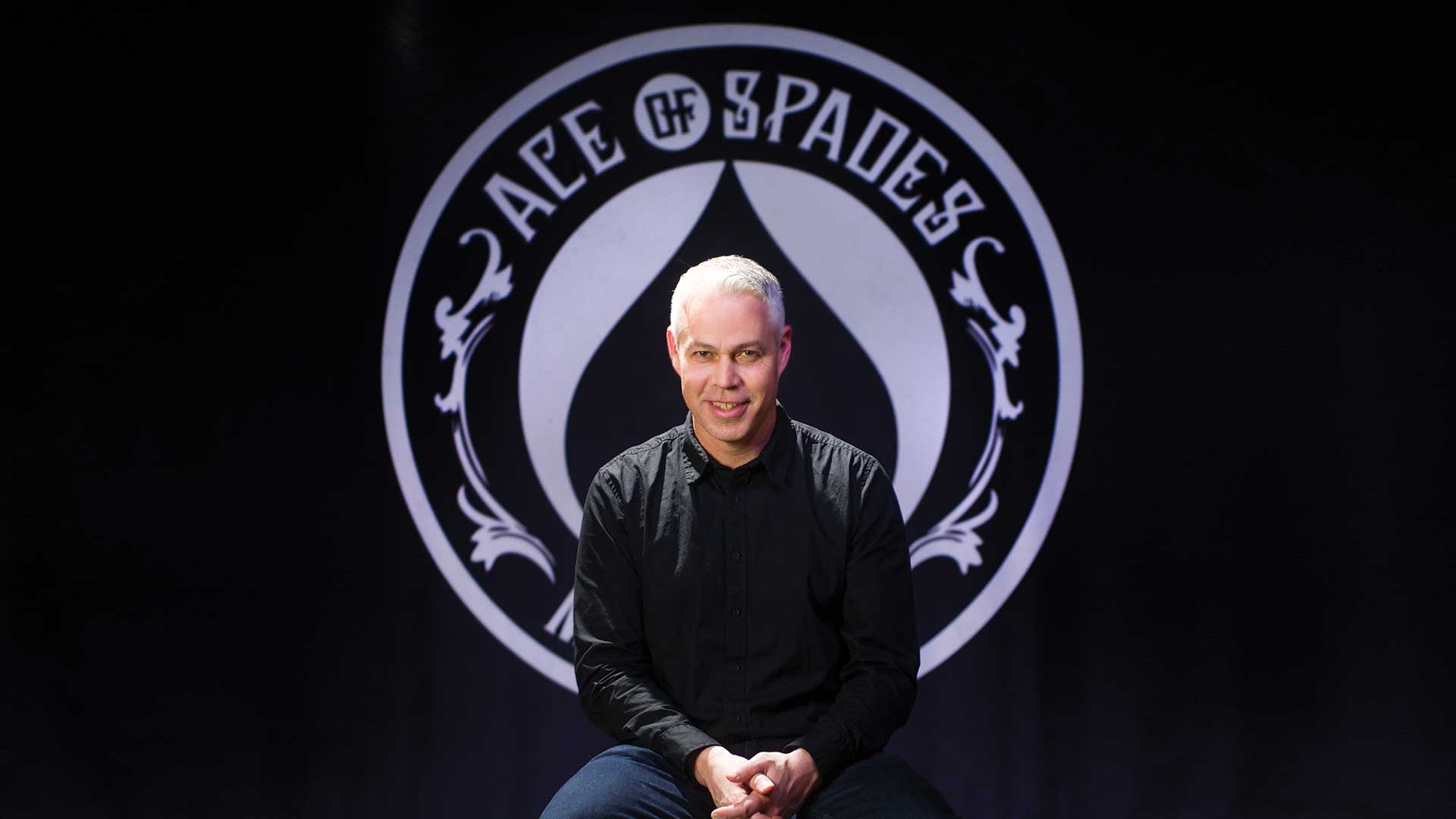
Photo by Karin Higgins/UC Davis
Bret Bair
Bret Bair ’95 took an unlikely path to his current career: From UC Davis, he headed to law school before dropping out to manage a rock band. His experiences ultimately brought him back to Sacramento, where he opened the music club Ace of Spades.
Along the way, he’s also bought midtown bars B-Side and Goldfield Trading Post, and invested in others, helping to grow the area — and its music influence.
“I’m honored to bring this to Sacramento,” Bair said. “It gives me a sense of accomplishment to put my little stamp on the city of Sacramento. When people would ask me why I was moving back to Sacramento, I would tell them it’s the land of opportunity.”
With the band: Bair managed several major-label acts, including popular ’00s groups Papa Roach and Hoobastank, before returning to Sacramento (from Los Angeles).
Acing Ace of Spades: Bair and a business partner secured the space for Ace of Spades in 2010, with a mission to bring live acts to the 1,000-person club. “We did wonder if Sacramento was big enough to support this music venue,” Bair said. “After a couple of years, we started getting more acts.” Over the years, the duo has booked Snoop Dogg, Imagine Dragons, Rob Zombie and many others.
Opportunity knocks: Last year, Bair fielded competing offers for the Ace of Spades business, eventually selling to Live Nation for an undisclosed price. He and his partner stayed on and continue to book the acts. “We realized that Sacramento is growing as a market and it was only a matter of time before a competitor entered the market,” Bair said.
Coming up next: Bair’s latest project is Holy Diver, an all-ages rock club set to open later this year in suburban Sacramento. He is also on the lookout for a second — and larger — location for a new Live Nation club. “We’re trying to make that happen as soon as possible.”
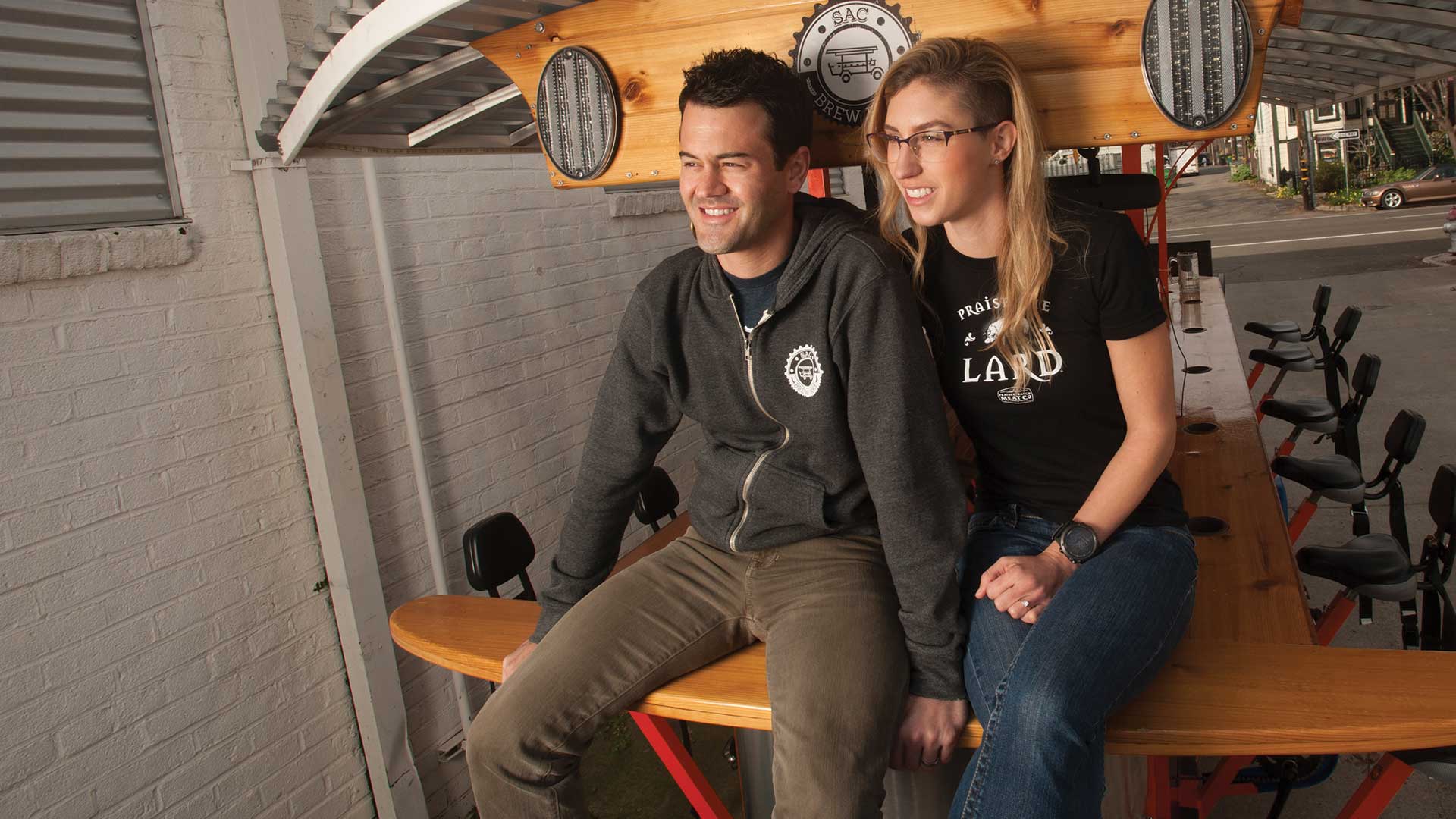
Photo by Gregory Urquiaga/UC Davis
Chris and Sarah Ferren-Cirino
Chris and Sarah Ferren-Cirino, ’07 and ’09, have always associated beer with exercise: Now husband and wife, they met on the UC Davis track team and would often drink beer with friends after a meet or an off-season triathlon.
It only makes sense, then, that they would draw on that combination for their 15-seat Sac Brew Bike, which functions like a pedal-powered pub crawl around midtown.
Background: When they lived in Portland, the pair would look forward to Fridays, when a brew bicycle would ride by their apartment. “We were seeing people having fun,” Sarah said. The pair started a similar venture in Sacramento in 2014, both leaving stable jobs, and eventually the business grew large enough to employ 18 people during the busy summer months.
Showing off local variety: Despite a 2016 law allowing alcohol on bikes like theirs, most of the drinking is done when the bicycle stops at local bars, which are chosen to match the interests of the group. “We have so many different types of bars,” Chris said. “Sacramento has it all.”
Part of the culture: The raucous bicycles have been embraced by the community — they were even invited to participate in the Sacramento Republic FC’s 2014 victory parade. And one day, the pair heard an unexpected spot on a local radio station promoting the business. “It made us feel like we’re part of the pop culture of Sacramento,” Chris said.
Coming up next: The Ferren-Cirinos have been helping satellite brew bike locations — which they own with other investors — get off the ground in San Jose and Reno. Business in Sacramento is picking up, too — they recently added a fifth bike.
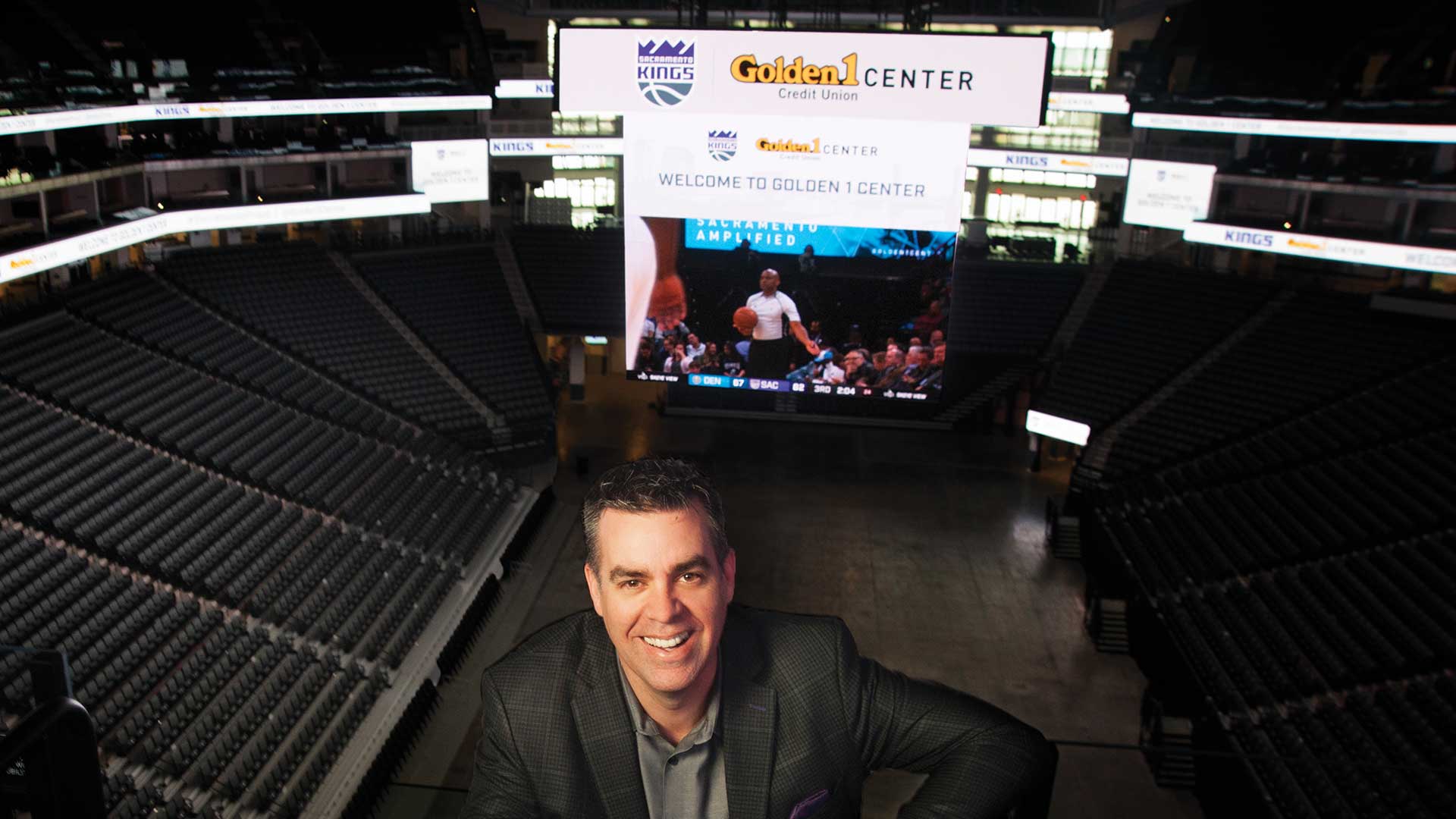
Photo by Gregory Urquiaga/UC Davis
Scott Moak
As executive director of the Sacramento Kings Foundation and vice president of community impact, Scott Moak ’95 spearheads programs and initiatives that champion health, education and sustainability in the region.
He said his path was charted from experiences at Davis, when he worked jobs at summer camps and in local schools. As an intern with the Cal-Learn program at Sutter Health, he would make home visits to support teens who were pregnant or parenting.
“I remember driving back over the Causeway from my internship and realizing this is what I want to be and do — helping people. It was never a challenge to do that kind of work every day.”
Background: Moak has spent his career committed to nonprofit organizations serving families and children in Sacramento, his hometown. Before joining the Kings, he served as director of nonprofit services at 3fold Communications, a Sacramento regional marketing firm.
Giving back: The Kings Foundation’s motto is “do good.” “We specialize in moments that help families take their minds off hard circumstances. It might be a VIP experience where we host them for a game, they meet a player and get some swag. Or a school rally, like the one we planned for families affected by the Oroville Dam crisis.”
Player power: The Kings Foundation works with more than 1,500 nonprofits and schools annually. “We hope to help students make good decisions. If kids look up to center Willie Cauley-Stein, and he visits their school and says that reading is important, it’s important to them.”
His “night job”: That roaring voice you hear amping up fans at Kings games? It’s Moak. He’s been the team’s public address announcer since 2002.
Hometown love: “I love watching Sacramento grow in a way a lot of us felt that it could, and I’m honored to be a small part of that renaissance.”
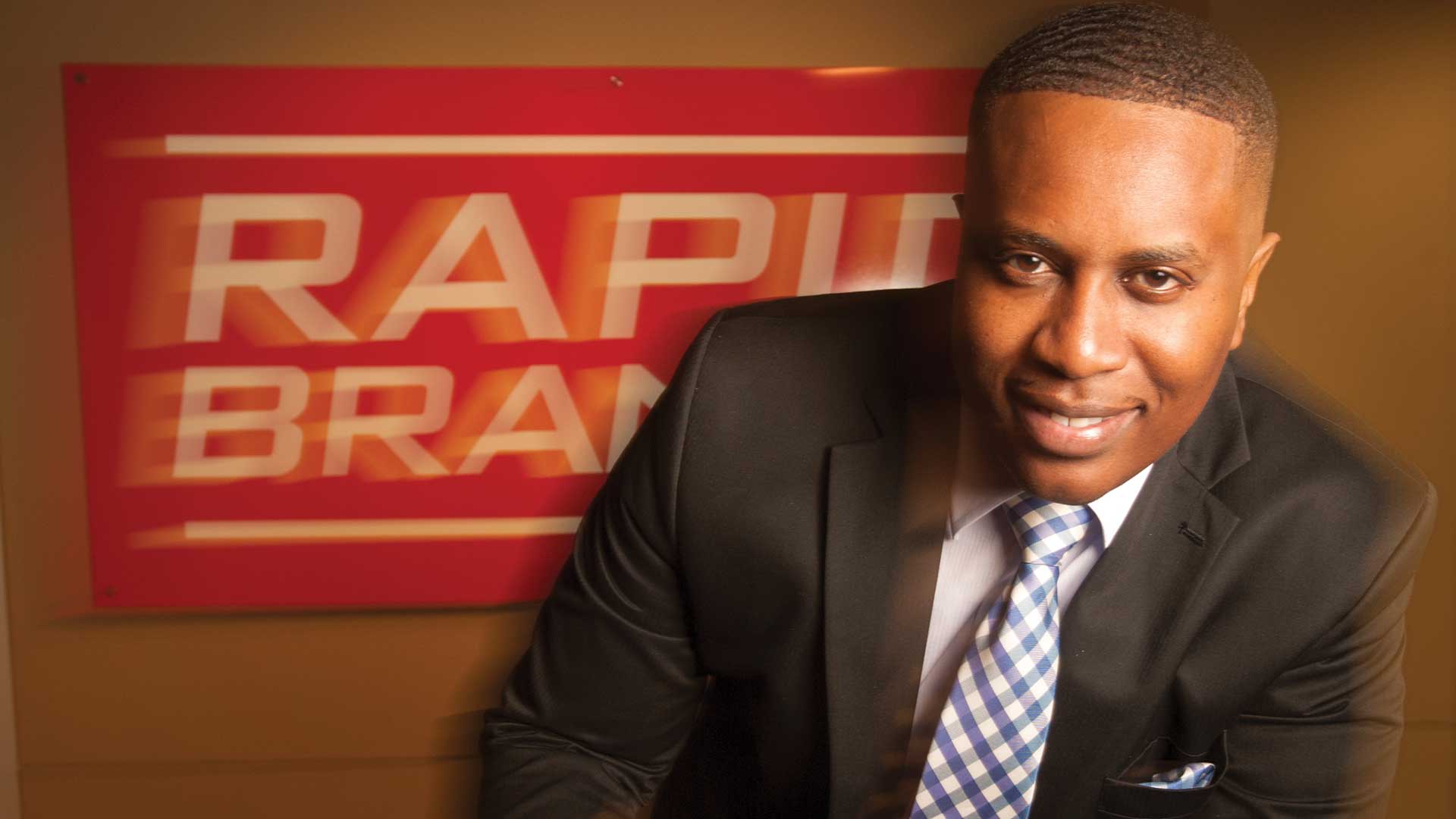
Photo by Gregory Urquiaga/UC Davis
Chris Johnson
Despite his short-cropped hair, Chris Johnson ’02 takes a long time to get a haircut — because he’s busy giving his barber business advice.
The entrepreneur, who built a bowl to cook ramen noodles in the microwave into a multimillion-dollar venture, alternates between expanding his business and helping others grow theirs.
Background: Johnson got a taste of entrepreneurship at 16, charging admission to a party in his parents’ garage and later renting space and organizing dances. In 2012, he created his Rapid Ramen Cooker. He is also the founder and CEO of The Johnson Group, a corporate recruiting company.
Thinking big: Johnson wants to instill an entrepreneurial drive in others, and jumps at the opportunity to speak at schools, especially those in an inner city. “They’ve never seen a guy like me, that looks like me, who has products in every Target, Wal-Mart and Walgreens in the country,” he said.
Expanding across the nation: He struck a deal on ABC’s “Shark Tank” in 2013 and most recently added microwave cookware to bake brownies and cakes — bringing the Rapid Brands product line to 15 items. He’s continuing to forge partnerships with brands like Minute Rice (for a rice cooker) and Betty Crocker (for the cake cooker). “My goal is to have at least one product in every single U.S. household.”
Building a legacy: His ultimate goal is to create a campaign called “Zero to a Billion,” which would help at least 1,000 people grow million-dollar businesses. “That’s the legacy I want to have.”
Sharp advice: His barber is well on his way. Johnson said Sacramento-based Chuka Torres is on track to sell more than $1 million this year from a line of custom haircutting tools.
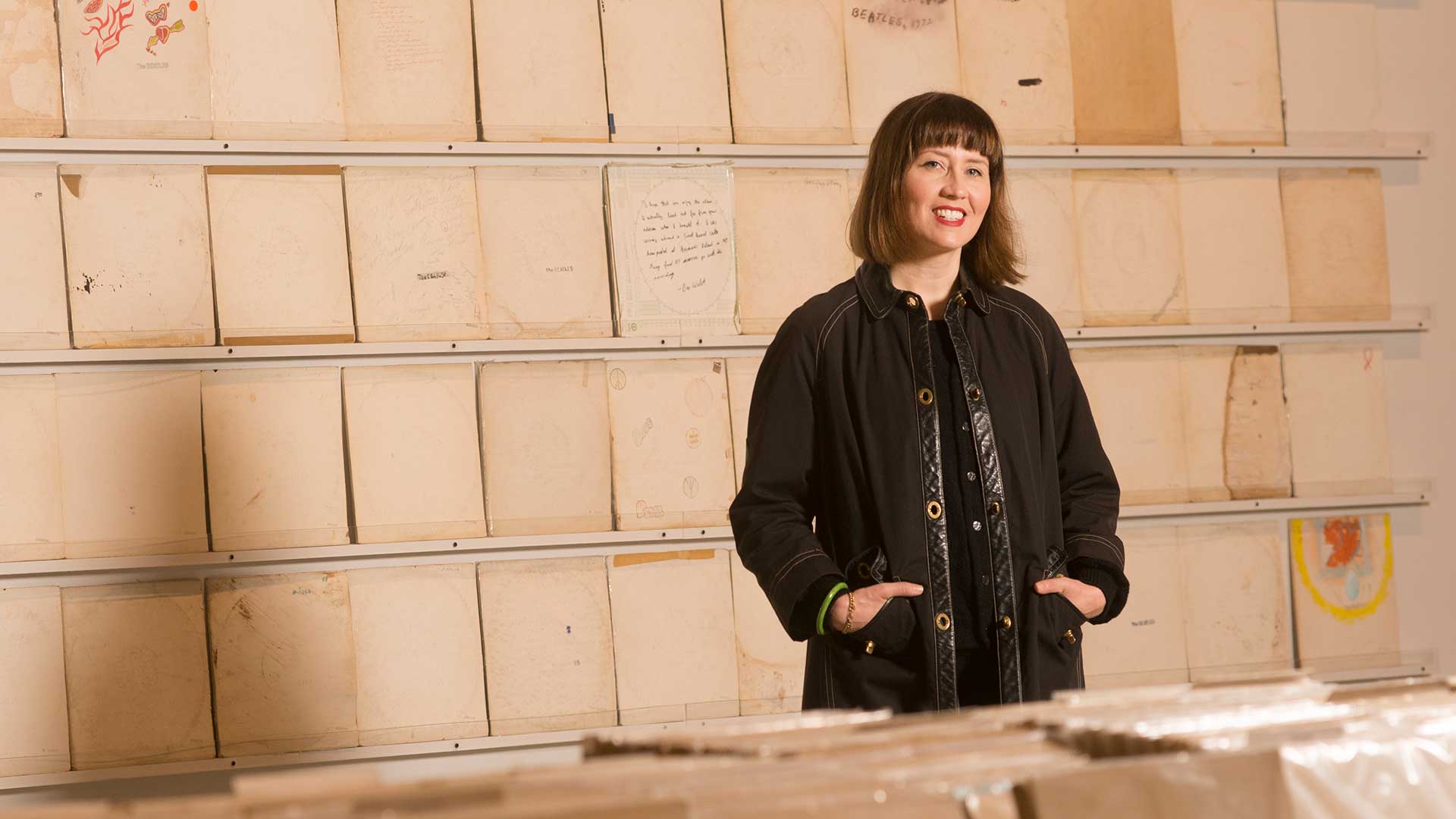
Photo by Gregory Urquiaga/UC Davis
Liv Moe
Liv Moe ’05 planned to become a professor when she majored in studio art at UC Davis. Instead, she’s helping define contemporary art for Sacramento.
Moe curates each exhibition as founding director of Verge Center for the Arts, a contemporary gallery and studio space in downtown Sacramento.
“I get to shape the narrative about art in the region,” said Moe. “In terms of what people are going to get exposed to that wouldn’t have been seen here otherwise — I get to drive that.”
Background: After UC Davis, Moe earned a master’s degree in fine and studio arts from California State University, Sacramento. She started out as a gallery sitter at Verge, eventually developing a year’s worth of programming and securing the top job.
On art in Sacramento: “The thing I was really compelled to do when this all started was to bring things to this region that wouldn’t make it here otherwise.”
Recent exhibits: Rutherford Chang’s We Buy White Albums (pictured), a celebration of the popular Beatles 1968 LP, made its way from New York to Liverpool to Sacramento.
Coming up next: This summer, Verge will feature international artists who have recently had major exhibitions elsewhere. In September and October, the center presents a decades-long survey of the Guerilla Girls’ work.

